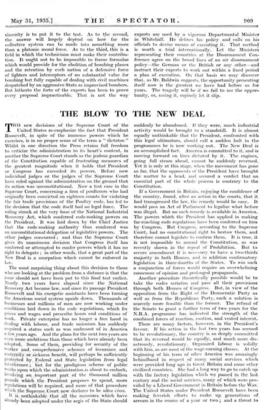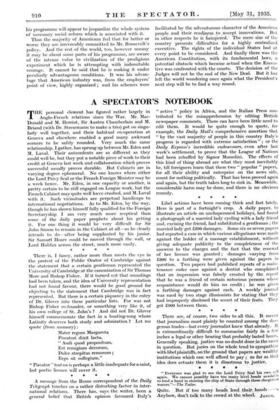THE BLOW TO THE NEW DEAL WO new decisions .
of the Supreme Court of the T United States re-emphasize the fact that President Roosevelt, in spite of the immense powers which he exercises, is in no proper sense of the term a " dictator." Whilst in one direction the Press retains full freedom to criticize the administration to its heart's content, in another the Supreme Court stands'as the jealous guardian of the Constitution capable of frustrating measures of the greatest magnitude when it holds that President or . Congress has exceeded its . powers. Before now individual judges or the judges of the Supreme Court have ruled against the administration on the ground that its action was unconstitutional. Now a test case in the Supreme Court, concerning a firm of poulterers who had originally been convicted on eighteen counts for violating the fair trade provisions of the Poultry code, has led to the decision, that the, code itself had no legal force. The ruling struck at the very: base of the National Industrial Recovery Act-, which conferred code-making powers on the President. It was laid down by the. Chief Justice that the code-making authority thus conferred was an unconstitutional delegation of legislative powers. The other judges concurred ; and thus the Supreme Court gives its, unanimous decision that Congress itself has conferred or attempted to confer powers which it has no right to delegate ; in other words, that a great part of the New Deal is ,a usurpation- which cannot be enforced in The most surprising thing about this decision.to those who are looking at the problem from a distance is that the issue should not have been put to this 'final test earlier. Nearly two years have elapsed since the National Recovery Act became law, and since its passage President Roosevelt and his energetic assistants have been turning the American social system upside down. Thousands of businesses and millions of men are now working under conditions laid down in the code regulations, which fix prices and wages and prescribe hours and conditions of work. Private enterprise has no longer ,a free hand in, dealing with labour, and trade unionism has suddenly. acquired a status such as was undreamt of in America a few, years ago. And the plans for the next two years are even more ambitious than those which have already been. adopted. Some of them, providing for security of the worker and, comprehensive schemes of insurance and maternity or,sickness benefit, will perhaps be sufficiently protected by.; Federal and State. legislation from legal interference ;, but for the, prodigious scheme of public works upon which the administration-is about to embark, involving an important .pArt of the thousand. million Pounds which the President proposes to spend, more regulations will be required, and more of that procedure which the Suprerne_Court..now declares to be ultra vires. It iqUirthinkal?le that all_ the measures _which have already been adopted under the aegis of the State should suddenly be abandoned. If they were, much industrial activity would be brought to a standstill. It is almost equally unthinkable that the President, confronted with this legal ultimatum, should call a sudden halt in the programmes he is now working out. The New Deal is an accomplished fact. America is committed to it, and is moving forward on lines dictated by it. The engines, going full steam ahead, cannot be suddenly reversed. Yet it is only at this stage, when the movement has gone so far; that the opponents of the-President have brought the matter to a head, and secured a verdict that an essential part of the whole process is contrary to the Constitution.
If a Government in Britain, enjoying the confidence of the country, found, after an action in the courts, that it had transgressed the law, the remedy would be easy. It would pass an Act of Parliament to legalize what before was illegal.. But no such remedy is available in America. The powers which the President has -applied in making far-reaching code regulations have been conferred on him by Congress. But Congress, according to the Supreme Court, had no constitutional right to bestow them, and therefore cannot legislate to confirm them. It is true, it is- not impossible to amend the Constitution, as was recently shown in the repeal of Prohibition. But to secure amendment it is necessary to have a two-thirds majority in both Houses, and in addition confirmatory legislation in three-fourths of the States. To win such a conjunction of forces would require an overwhelming consensus of opinion and prolonged propaganda.
Another procedure theoretically possible would. be to take the codes seriatim and pass all their provisions through both Houses of Congress. But, in view of the opposition from the Right of the Democratic Party as well as from the Republican Party, such a solution is scarcely more feasible than. the former. The refusal of the, Senate to grant a further term of two years for the N.R.A. programme has indicated the . strength of: the combined forces of reaction, caution, and .vested interest.
There are many factors, however, in the President's favour. If his action in the last. two years has seemed to be revolutionary, the country is so, deeply committed that its reversal would be .equally, and much more dis- astrously, revolutionary. Organized labour is solidly with.him, as are most of the wage-earning classes. At the beginning of his term of office America was amazingly behindhand in respect of many social services which were provided long ago in Great Britain and some other civilized countries. She had a long way to go to catch up with the factory legislation which we passed in the last century and the social services, many of which were pro- vided by a Liberal Government in Britain before the War. The United States under President Roosevelt have been making feverish efforts to make up generations of arrears in the course of a year or two ; and a threat to his programme will appear to jeopardize the whole system of necessary social reform which is associated with it.
Thus the majority of Americans feel that for better or worse they are irrevocably committed to Mr. Roosevelt's policy. And the rest of the world, too, however uneasy it may be about some parts of his programme, are aware of the intense value to civilization of the prodigious experiment which he is attempting with indomitable courage. It cannot be said that he is making it under peculiarly advantageous conditions. It was his advan- tage that American industry was, from the employers' point of view, highly organized ; and his schemes were facilitated by the adventurous character of the American people and their readjarzikrs_, to , accept innovations. But in other respects he is fiamed.' The mere size of the country presents difficulties for a highly centralized executive. The rights of the individual States had at every point to be considered. And finally there was the American Constitution, with its fundamental laws, a potential obstacle which became actual when the Execu- tive was confronted with the courts. The decision of the Judges will not be the end of the New Deal. But it has left the world wondering once again what the President's next step will be to find a way round.



























































 Previous page
Previous page